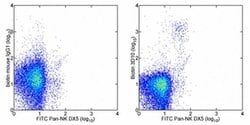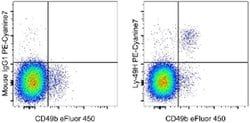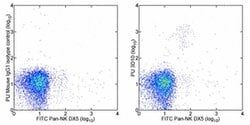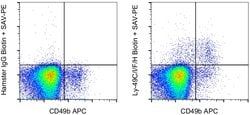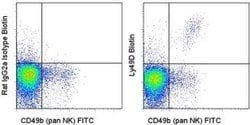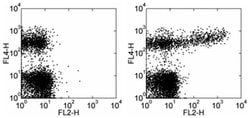50-119-17
Ly-49D Monoclonal Antibody (eBio4E5 (4E5)), Biotin, eBioscience™, Invitrogen™
Manufacturer: Invitrogen
Select a Size
| Pack Size | SKU | Availability | Price |
|---|---|---|---|
| Each of 1 | 50-119-17-Each-of-1 | In Stock | ₹ 24,030.00 |
50-119-17 - Each of 1
In Stock
Quantity
1
Base Price: ₹ 24,030.00
GST (18%): ₹ 4,325.40
Total Price: ₹ 28,355.40
Antigen
Ly-49D
Classification
Monoclonal
Concentration
0.5 mg/mL
Formulation
PBS with 0.09% sodium azide; pH 7.2
Gene Accession No.
Q60651
Gene Symbols
Klra4
Purification Method
Affinity chromatography
Regulatory Status
RUO
Gene ID (Entrez)
16635
Content And Storage
4° C, store in dark, DO NOT FREEZE!
Form
Liquid
Applications
Flow Cytometry
Clone
eBio4E5 (4E5)
Conjugate
Biotin
Gene
Klra4
Gene Alias
Chok; killer cell lectin-like receptor 4; killer cell lectin-like receptor subfamily A member 32; killer cell lectin-like receptor subfamily A member 33; killer cell lectin-like receptor, subfamily A, member 4; Klra32; Klra33; Klra4; Ly49d; Ly-49d; Ly49-d; ly49r<129>; Lymphocyte antigen 49d; T-cell surface glycoprotein Ly-49D
Host Species
Rat
Quantity
100 μg
Primary or Secondary
Primary
Target Species
Mouse
Product Type
Antibody
Isotype
IgG2a κ
Description
- Description: The monoclonal antibody eBio4E5 (4E5) reacts with Ly-49D, an activating member of the Ly-49 family of NK cell receptors
- This family of receptors form homodimers that recognize MHC Class I molecules
- The activating Ly-49 receptors (Ly-49D and Ly-49H) do not contain immune receptor tyrosine-based inhibitory motifs (ITIM) in their cytoplasmic domains, distinguishing them from the inhibitory Ly-49 family members
- Instead, activating Ly-49 molecules have been shown to associate with DAP12 which contains an immunoreceptor tyrosine-based activation motif (ITAM) that is required for positive signaling
- Expression of different Ly-49 family members is not linked, therefore, several Ly-49 proteins can be expressed on the same cells
- Expression of Ly-49D on subsets of NK cells is strain-dependent and is found in C57BL/6, CB6F1 and SJL mice, while BALB/c, DBA/2, AKR and CBA/J mice are negative for Ly-49D
- In 129/J mice, eBio4E5 also recognizes Ly-49O, Ly-49V and Ly-49R
- eBio4E5 is reported to have functional (activating) activity
- Applications Reported: This eBio4E5 (4E5) antibody has been reported for use in flow cytometric analysis
- Applications Tested: This eBio4E5 (4E5) antibody has been tested by flow cytometric analysis of mouse splenocytes
- This can be used at less than or equal to 0.5 μg per test
- A test is defined as the amount (μg) of antibody that will stain a cell sample in a final volume of 100 μL
- Ly-49D, an activating member of the Ly-49 family of NK cell receptors
- This family of receptors form homodimers that recognize MHC Class I molecules
- The activating Ly-49 receptors (Ly-49D and Ly-49H) do not contain immune receptor tyrosine-based inhibitory motifs (ITIM) in their cytoplasmic domains, distinguishing them from the inhibitory Ly-49 family members
- Instead, activating Ly-49 molecules have been shown to associate with DAP12 which contains an immunoreceptor tyrosine-based activation motif (ITAM) that is required for positive signaling
- Expression of different Ly-49 family members is not linked, therefore, several Ly-49 proteins can be expressed on the same cells
- Expression of Ly-49D on subsets of NK cells is strain-dependent and is found in C57BL/6, CB6F1 and SJL mice, while BALB/c, DBA/2, AKR and CBA/J mice are negative for Ly-49D
- In 129/J mice, eBio4E5 also recognizes Ly-49O, Ly-49V and Ly-49R.
Compare Similar Items
Show Difference
Antigen: Ly-49D
Classification: Monoclonal
Concentration: 0.5 mg/mL
Formulation: PBS with 0.09% sodium azide; pH 7.2
Gene Accession No.: Q60651
Gene Symbols: Klra4
Purification Method: Affinity chromatography
Regulatory Status: RUO
Gene ID (Entrez): 16635
Content And Storage: 4° C, store in dark, DO NOT FREEZE!
Form: Liquid
Applications: Flow Cytometry
Clone: eBio4E5 (4E5)
Conjugate: Biotin
Gene: Klra4
Gene Alias: Chok; killer cell lectin-like receptor 4; killer cell lectin-like receptor subfamily A member 32; killer cell lectin-like receptor subfamily A member 33; killer cell lectin-like receptor, subfamily A, member 4; Klra32; Klra33; Klra4; Ly49d; Ly-49d; Ly49-d; ly49r<129>; Lymphocyte antigen 49d; T-cell surface glycoprotein Ly-49D
Host Species: Rat
Quantity: 100 μg
Primary or Secondary: Primary
Target Species: Mouse
Product Type: Antibody
Isotype: IgG2a κ
Antigen:
Ly-49D
Classification:
Monoclonal
Concentration:
0.5 mg/mL
Formulation:
PBS with 0.09% sodium azide; pH 7.2
Gene Accession No.:
Q60651
Gene Symbols:
Klra4
Purification Method:
Affinity chromatography
Regulatory Status:
RUO
Gene ID (Entrez):
16635
Content And Storage:
4° C, store in dark, DO NOT FREEZE!
Form:
Liquid
Applications:
Flow Cytometry
Clone:
eBio4E5 (4E5)
Conjugate:
Biotin
Gene:
Klra4
Gene Alias:
Chok; killer cell lectin-like receptor 4; killer cell lectin-like receptor subfamily A member 32; killer cell lectin-like receptor subfamily A member 33; killer cell lectin-like receptor, subfamily A, member 4; Klra32; Klra33; Klra4; Ly49d; Ly-49d; Ly49-d; ly49r<129>; Lymphocyte antigen 49d; T-cell surface glycoprotein Ly-49D
Host Species:
Rat
Quantity:
100 μg
Primary or Secondary:
Primary
Target Species:
Mouse
Product Type:
Antibody
Isotype:
IgG2a κ
Antigen: IgM
Classification: Monoclonal
Concentration: 0.5 mg/mL
Formulation: PBS with 0.09% sodium azide; pH 7.2
Gene Accession No.: P01872
Gene Symbols: Ighm
Purification Method: Affinity chromatography
Regulatory Status: RUO
Gene ID (Entrez): 16019
Content And Storage: 4° C, store in dark, DO NOT FREEZE!
Form: Liquid
Applications: Flow Cytometry, Immunocytochemistry, Immunohistochemistry (Paraffin)
Clone: II/41
Conjugate: Biotin
Gene: Ighm
Gene Alias: AGM1; AI326478; Igh6; Igh-6; Ighm; Igh-M; Igm; immunoglobulin heavy constant mu; MU; muH; VH
Host Species: Rat
Quantity: 500 μg
Primary or Secondary: Primary
Target Species: Mouse
Product Type: Antibody
Isotype: IgG2a κ
Antigen:
IgM
Classification:
Monoclonal
Concentration:
0.5 mg/mL
Formulation:
PBS with 0.09% sodium azide; pH 7.2
Gene Accession No.:
P01872
Gene Symbols:
Ighm
Purification Method:
Affinity chromatography
Regulatory Status:
RUO
Gene ID (Entrez):
16019
Content And Storage:
4° C, store in dark, DO NOT FREEZE!
Form:
Liquid
Applications:
Flow Cytometry, Immunocytochemistry, Immunohistochemistry (Paraffin)
Clone:
II/41
Conjugate:
Biotin
Gene:
Ighm
Gene Alias:
AGM1; AI326478; Igh6; Igh-6; Ighm; Igh-M; Igm; immunoglobulin heavy constant mu; MU; muH; VH
Host Species:
Rat
Quantity:
500 μg
Primary or Secondary:
Primary
Target Species:
Mouse
Product Type:
Antibody
Isotype:
IgG2a κ
Antigen: CD326 (EpCAM)
Classification: Monoclonal
Concentration: 0.5 mg/mL
Formulation: PBS with 0.09% sodium azide; pH 7.2
Gene Accession No.: Q99JW5
Gene Symbols: EPCAM
Purification Method: Affinity chromatography
Regulatory Status: RUO
Gene ID (Entrez): 17075
Content And Storage: 4° C, store in dark, DO NOT FREEZE!
Form: Liquid
Applications: Flow Cytometry
Clone: G8.8
Conjugate: Biotin
Gene: EPCAM
Gene Alias: adenocarcinoma-associated antigen; CD326; cell surface glycoprotein Trop-1; DIAR5; EGP; EGP-2; EGP314; EGP40; EPCAM; Ep-CAM; EpCAM1; epithelial cell adhesion molecule; Epithelial cell surface antigen; Epithelial glycoprotein; Epithelial glycoprotein 314; ESA; GA733-2; gp40; hEGP314; HNPCC8; human epithelial glycoprotein-2; KS 1/4 antigen; KS1/4; KSA; Ly74; lymphocyte antigen 74; M1S2; M4S1; major gastrointestinal tumor-associated protein GA733-2; mEGP314; membrane component, chromosome 4, surface marker (35kD glycoprotein); MIC18; MK-1; panepithelial glycoprotein 314; protein 289A; Protein D5.7A; Tacsd1; Tacstd1; TROP1; Trop-1 protein; Tumor-associated calcium signal transducer 1
Host Species: Rat
Quantity: 25 μg
Primary or Secondary: Primary
Target Species: Mouse
Product Type: Antibody
Isotype: IgG2a κ
Antigen:
CD326 (EpCAM)
Classification:
Monoclonal
Concentration:
0.5 mg/mL
Formulation:
PBS with 0.09% sodium azide; pH 7.2
Gene Accession No.:
Q99JW5
Gene Symbols:
EPCAM
Purification Method:
Affinity chromatography
Regulatory Status:
RUO
Gene ID (Entrez):
17075
Content And Storage:
4° C, store in dark, DO NOT FREEZE!
Form:
Liquid
Applications:
Flow Cytometry
Clone:
G8.8
Conjugate:
Biotin
Gene:
EPCAM
Gene Alias:
adenocarcinoma-associated antigen; CD326; cell surface glycoprotein Trop-1; DIAR5; EGP; EGP-2; EGP314; EGP40; EPCAM; Ep-CAM; EpCAM1; epithelial cell adhesion molecule; Epithelial cell surface antigen; Epithelial glycoprotein; Epithelial glycoprotein 314; ESA; GA733-2; gp40; hEGP314; HNPCC8; human epithelial glycoprotein-2; KS 1/4 antigen; KS1/4; KSA; Ly74; lymphocyte antigen 74; M1S2; M4S1; major gastrointestinal tumor-associated protein GA733-2; mEGP314; membrane component, chromosome 4, surface marker (35kD glycoprotein); MIC18; MK-1; panepithelial glycoprotein 314; protein 289A; Protein D5.7A; Tacsd1; Tacstd1; TROP1; Trop-1 protein; Tumor-associated calcium signal transducer 1
Host Species:
Rat
Quantity:
25 μg
Primary or Secondary:
Primary
Target Species:
Mouse
Product Type:
Antibody
Isotype:
IgG2a κ
Antigen: CD326 (EpCAM)
Classification: Monoclonal
Concentration: 0.5 mg/mL
Formulation: PBS with 0.09% sodium azide; pH 7.2
Gene Accession No.: Q99JW5
Gene Symbols: EPCAM
Purification Method: Affinity chromatography
Regulatory Status: RUO
Gene ID (Entrez): 17075
Content And Storage: 4° C, store in dark, DO NOT FREEZE!
Form: Liquid
Applications: Flow Cytometry
Clone: G8.8
Conjugate: Biotin
Gene: EPCAM
Gene Alias: adenocarcinoma-associated antigen; CD326; cell surface glycoprotein Trop-1; DIAR5; EGP; EGP-2; EGP314; EGP40; EPCAM; Ep-CAM; EpCAM1; epithelial cell adhesion molecule; Epithelial cell surface antigen; Epithelial glycoprotein; Epithelial glycoprotein 314; ESA; GA733-2; gp40; hEGP314; HNPCC8; human epithelial glycoprotein-2; KS 1/4 antigen; KS1/4; KSA; Ly74; lymphocyte antigen 74; M1S2; M4S1; major gastrointestinal tumor-associated protein GA733-2; mEGP314; membrane component, chromosome 4, surface marker (35kD glycoprotein); MIC18; MK-1; panepithelial glycoprotein 314; protein 289A; Protein D5.7A; Tacsd1; Tacstd1; TROP1; Trop-1 protein; Tumor-associated calcium signal transducer 1
Host Species: Rat
Quantity: 100 μg
Primary or Secondary: Primary
Target Species: Mouse
Product Type: Antibody
Isotype: IgG2a κ
Antigen:
CD326 (EpCAM)
Classification:
Monoclonal
Concentration:
0.5 mg/mL
Formulation:
PBS with 0.09% sodium azide; pH 7.2
Gene Accession No.:
Q99JW5
Gene Symbols:
EPCAM
Purification Method:
Affinity chromatography
Regulatory Status:
RUO
Gene ID (Entrez):
17075
Content And Storage:
4° C, store in dark, DO NOT FREEZE!
Form:
Liquid
Applications:
Flow Cytometry
Clone:
G8.8
Conjugate:
Biotin
Gene:
EPCAM
Gene Alias:
adenocarcinoma-associated antigen; CD326; cell surface glycoprotein Trop-1; DIAR5; EGP; EGP-2; EGP314; EGP40; EPCAM; Ep-CAM; EpCAM1; epithelial cell adhesion molecule; Epithelial cell surface antigen; Epithelial glycoprotein; Epithelial glycoprotein 314; ESA; GA733-2; gp40; hEGP314; HNPCC8; human epithelial glycoprotein-2; KS 1/4 antigen; KS1/4; KSA; Ly74; lymphocyte antigen 74; M1S2; M4S1; major gastrointestinal tumor-associated protein GA733-2; mEGP314; membrane component, chromosome 4, surface marker (35kD glycoprotein); MIC18; MK-1; panepithelial glycoprotein 314; protein 289A; Protein D5.7A; Tacsd1; Tacstd1; TROP1; Trop-1 protein; Tumor-associated calcium signal transducer 1
Host Species:
Rat
Quantity:
100 μg
Primary or Secondary:
Primary
Target Species:
Mouse
Product Type:
Antibody
Isotype:
IgG2a κ
